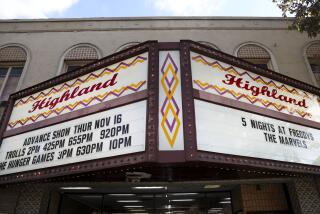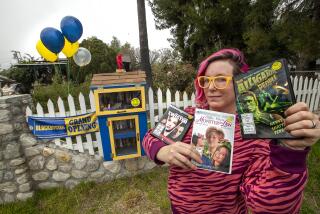Hollywood, help save the small town cinema
My great-grandfather founded the Rialto Theater in tiny Grayling, Mich., in 1915. His handbills advertised an opening-day screening of “The Twenty-Million-Dollar Mystery” on “two good single reels.”
I run the same theater today, almost 99 years later. But two good single reels aren’t what they used to be. Our theater is threatened now because Hollywood movie studios are phasing out 35mm film and beginning to distribute new movies only in digital format. In December, Paramount Pictures announced that “Anchorman 2” would be its final movie printed on film, and other studios are expected to quickly follow suit. Unless we convert to digital projection — an undertaking that will cost upward of $60,000 (or four times as much as our last new film projector) — our theater will have to close.
Thousands of other small-town theaters are similarly at risk. According to the National Assn. of Theatre Owners, as of July there were 4,126 screens in the United States still projecting film — many of them in small towns and many that will likely close in the coming year because they cannot afford the digital transition.
When I consider what the Rialto means to this town of 1,884, I sense what a blow to rural America this loss of movie houses will be. The independent movie theater retains an outsize role in these communities that is quite unlike that of a city or suburban multiplex. In Grayling, our Art Deco theater (rebuilt in 1930 after a fire) is the architectural landmark on the main street of town. It is the only venue that draws large crowds to downtown year in and year out. Quite apart from any historical importance, closing this theater would irreparably deform the center of our town.
There is more at stake than just the fate of a speck on the map of northern Michigan. Small-town movie theaters still have a national purpose: the integration of far-flung places into our national culture. Every time we show a blockbuster on opening night, every time we screen a documentary or a foreign film, every time our audience feels empathy for a character the likes of whom they might never encounter in real life, we are issuing a reminder: yes, this little town is part of the wider world.
Television and the Internet notwithstanding, the movie theater plays a special role in cultural inclusion. In a small town, the movie theater is a quasi-public institution that can lend significance to a film that streaming it on Netflix never will. But a movie theater doesn’t just connect the members of a small community to the world, it also connects them to one another. A busy night at this theater, with excited kids running all over the place and the laughter of a couple hundred people in the auditorium, is a collective experience that is simply irreplaceable.
The people in our community understand this and have never questioned the continued relevance of a movie theater to their common life. Rather than close the place, we launched an online fundraising campaign that is well on its way to paying not just for a digital projector but a restoration of the 1930s-era interior.
So the Rialto has a shot at making it over the digital hurdle. Still, the movie industry itself could do more to help other independent theaters stay open. Studios could offer, for example, a small rebate on the film rental fees paid in recent years to be applied to making the digital transition. That would link any assistance to the theater’s actual contribution to the studios’ bottom line, and enable small markets to continue generating revenue. Surely this would serve the studios’ interests better than simply allowing theaters to close.
If studios and small theater owners do not find a creative and cooperative solution to this problem, many viable and culturally significant businesses will be pointlessly destroyed in the coming months. At stake is a piece of our heritage as well as the richness of our communal life.
When I took over the theater from my father, I asked him why he’d thought it was important to keep it open all these years. “Because,” he said, “a community suffers when people don’t do things together. You can’t just do everything all by yourself.”
If there’s one thing we should have learned in this country by now, it’s that.
Jordan Stancil took over operations of the Rialto Theater in 2013. Its Kickstarter campaign ends Feb. 28.
More to Read
A cure for the common opinion
Get thought-provoking perspectives with our weekly newsletter.
You may occasionally receive promotional content from the Los Angeles Times.






